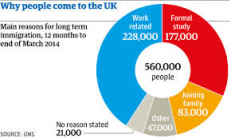
Last time, we saw what had happened to immigrants in the UK up until the 1960’s. Now we’ll have a look at what has happened since the “swinging sixties”, through numerous humanitarian problems, and finally up until the present day. You can expect immigration to be a high priority for many voters this general election, so knowing the facts rather than what the media chooses to tell you is very important indeed.
In the late 1960s and early 1970s, there were a few crises in East Africa, the most famous being in Kenya and Uganda. In 1968, after Kenya gained independence from Britain, many Indians who were living there began to feel uneasy. There was a policy of “Africanisation” – i.e., making sure they got rid of all the stuff from the British Empire, and replacing it with African things. This also included making people choose between Kenyan and British citizenship. Indian people did not fit into this African category, and there was a lot of resentment to them from the local Kenyans. East African Asians were successful in business, and despite being a tiny minority of less than 5%, they pretty much controlled and ran the Kenyan economy. When Kenya gained independence, these people lost some protection they had from the British, and tensions rose rapidly. Many Indians fled Kenya, because they believed themselves to be British citizens. Unfortunately the British government revoked their rights as Commonwealth citizens, so many of these Indians were left stateless (without citizenship).
A similar thing happened in Uganda. The dictator Idi Amin rose to power in 1971, and set about his own “Africanisation” policies. He threatened that Indians had to leave Uganda within 90 days, and Amin was already brutally killing his own people, so Indians feared what would happen to them. Once again, many tried to flee to Britain, but the British government tried to back out of giving them their citizenship rights. However, there was a lot of pressure put on them by the international community, so Britain had to allow a certain number of refugees through. Owing to their experience in business, these East African Asians have become one of the most successful ethnic minorities in the country.
Britain joined what is now the EU in 1973. In some ways, this replaced the old Commonwealth, and there is now free movement of goods and people between all EU countries. This means that many of the immigrants to Britain are now from other parts of Europe, particularly Polish people. This is partly why UKIP is so popular – people fear what they believe is “unrestricted” migration. They think that millions of immigrants are coming in, but that’s simply not true.
People are also sceptical about refugees and asylum seekers from outside Europe. Britain is letting a tiny amount of Syrians come to the UK compared to the rest of Europe, and not many refugees in general are allowed to settle in Britain. So this fear is also unfounded. People will often fear what is unknown to them, but the way people talk about immigrants as if they were not human is just frightening.
Image from: http://www.theguardian.com/uk-news/2014/aug/28/uk-net-migration-soars-to-243000-theresa-may

0 Comment:
Be the first one to comment on this article.